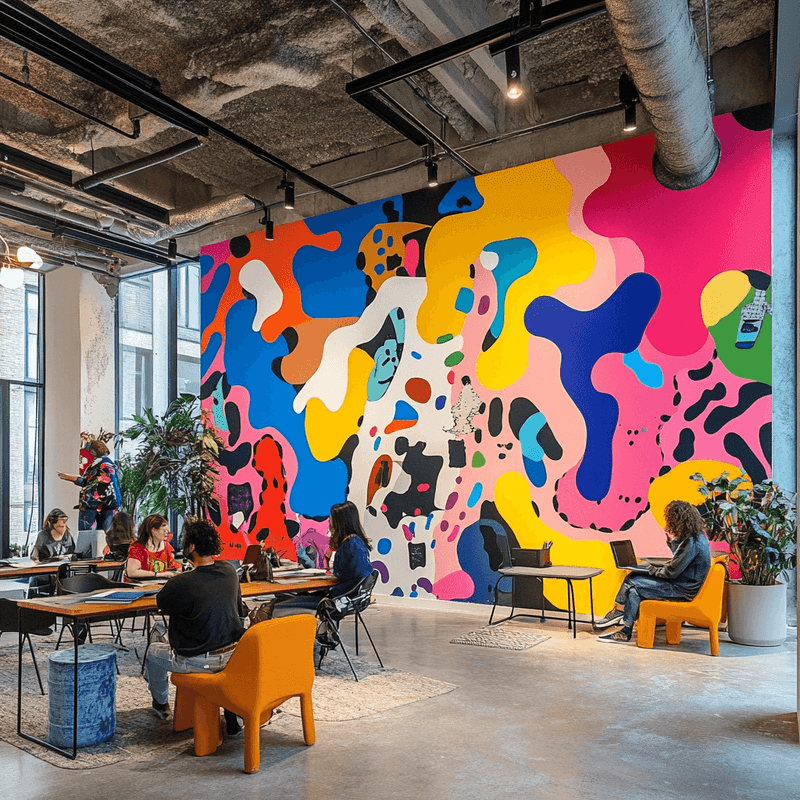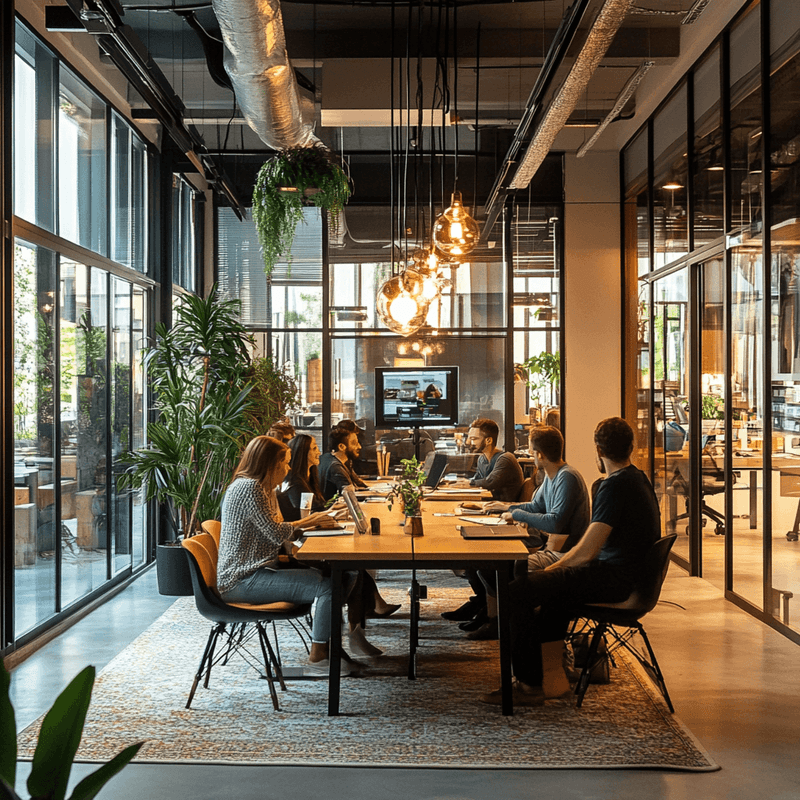
When it comes to finding office space for employees, one question always comes up: what's the best choice between an Open Space and a private office? On the one hand, Open Space is synonymous with conviviality and sharing. On the other, a private office offers privacy and calm. The expression "two rooms, two atmospheres" has never been more apt. But what office layout should you choose to keep your employees motivated?
Open Space vs. private office: definitions
A reminder of the definition of Open Space
As its French translation suggests, open space is an open office space with no partitions or corridors.
This office layout, adopted by 1 in 5 employees, enables teams to work together in a single space.
It is equipped with bench seating for 2 to 6 people, as shown here:

The definition of a private office
There's no need to dwell on the definition of a private office. It's a private space, ideal for companies wishing to enjoy the benefits of coworking spaces while still having privacy. This type of layout is equipped with partitions or walls for optimum soundproofing and confidentiality.
The advantages of Open Space (compared to a private office)
Open Space vs. private office: is your heart in the right place? Here are the main advantages of Open Space.
Collaboration and communication
Being open to the world encourages exchanges between colleagues. If the person Aurélie wants to talk to isn't opposite or next to her, she'll only have to walk a few yards to meet him or her. Solidarity, mutual aid and social ties are therefore encouraged in this configuration.
⚠️ Private offices can be shared. And collaboration in small groups can be very effective.
Cost savings
In an open space or call center, an employee occupies an average of 4 to 5 m². Private offices, on the other hand, are generally larger (10 to 15 m²). Companies that opt for open space will be able to accommodate more employees in fewer square meters. This makes them more profitable.
They'll also be able to save on fit-out costs. Once the premises have been rented, there's no need to install partitions or doors. Only furniture (chairs, benchs, computers, coffee machines) will be needed, if you opt for an empty space.
If you opt for a coworking space, all the necessary services and furniture will be included in your subscription. So there's no extra cost to you.
Good to know: AFNOR recommends a minimum working area of 11 m² per person, and 15 m² per person in a noisy space.
Easy supervision
Managers and employees can work on the same bench, which reduces verticality. This makes it easier to monitor projects and pass on instructions. It also means you can congratulate your staff on every small victory, and solve their problems at a minute's notice.
The advantages of the private office (compared to Open Space)
Still in the dark? Here are the advantages of a private office over an open-plan office.
Favors concentration
Unlike open spaces, which can be noisy (e.g. ringing phones, ambient hubbub), private offices are conducive to concentration. Being alone at a partitioned desk allows new ideas to emerge and allows you to focus on your work without too many interruptions.
Less stress for employees
Being constantly surrounded by other people can be a source of stress. A private office is like a safe space for the employee: a place where his or her personality can express itself without risk. They can personalize this friendly bubble to make themselves feel at home (e.g. family photos, mugs, plants...).
Greater confidentiality
Some information may not concern the whole company. In open-plan offices, even whispered phrases can be overheard. In a private office, it's different: all you have to do to discuss a confidential subject is close the door.
Open Space vs. private office: how to make the right choice?
To choose between Open Space and private offices, you'll need to take a number of criteria into account:
Your employees' professional activity
Some professions require you to enter transactions or correct 300-page reports all day long. For these professionals, it's essential to have a room that's quiet and conducive to concentration.
In an open space, background noise is permanent. In addition to the stress caused by this type of environment, employees may make more mistakes or see their performance suffer. On the other hand, sales people and account managers (who are often on the phone) can work in open spaces without difficulty.
Practical tip: If you opt for open space, we advise you to divide your team members according to their activity. For example, you could put Julie, Anaïs and Tom (graphic designers) with Alexis, Max and Julie (Marketing) in one corner of the open space and Jules, Marc and Thibault (developers) with Lucie (data analyst) in another.
Your employees' desires
Some employees are more introverted than others. Some people like to be in contact with their colleagues throughout the day, while others prefer peace and quiet to do their best work. That's why it's essential to sound out your employees and adapt to their personalities.
Your budget
Finally, you'll need to consider the price factor and the number of workstations required. We even advise you to set a budget per employee.
You can then contact us for personalized advice. We have the spaces you're looking for, whether open spaces, private offices or office suites.
ℹ️ An open space, a manager's office and a private meeting room are included in an "office suite" package.
Open space or individual offices? Both!
Open spaces and individual private offices each have their advantages and disadvantages. That's why more and more companies are adopting a hybrid approach: open space + individual offices.
To take things a step further, some coworking spaces include collaborative work rooms, meeting rooms, relaxation areas, isolation modules... And each employee can reserve his or her workspace according to his or her needs and desires at the time. There are no assigned desks.
This is what we call flex office.
At workin.space, we find the right office to meet your employees' needs.
-
How do companies assert their identity in a shared space?

12/05/2025 How do companies assert their identity in a shared space?
Coworking spaces are places designed for the collective: so how can a company assert its own identity? While flexible space brands strive to be recognizable and identifiable among a thousand, they also enable their occupants to make their own workspaces their own.
-
Coworking: how to create, open and run a shared workplace?

03/05/2025 Coworking: how to create, open and run a shared workplace?
Coworking spaces are springing up all over France. How do they emerge today, and what room is left for new entrants to the flexible workspace market?
-
Coworking: how to prepare employees for flexible working?

03/04/2025 Coworking: how to prepare employees for flexible working?
As coworking spaces win over more and more employees, how can companies support this shift towards greater flexibility, without losing cohesion or performance? Here are a few tips!